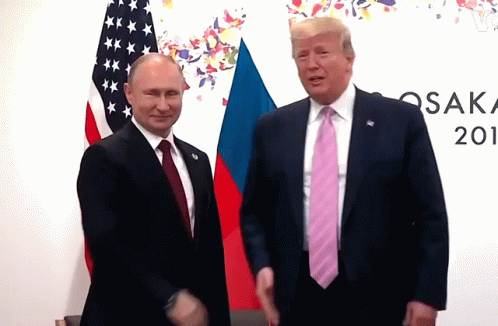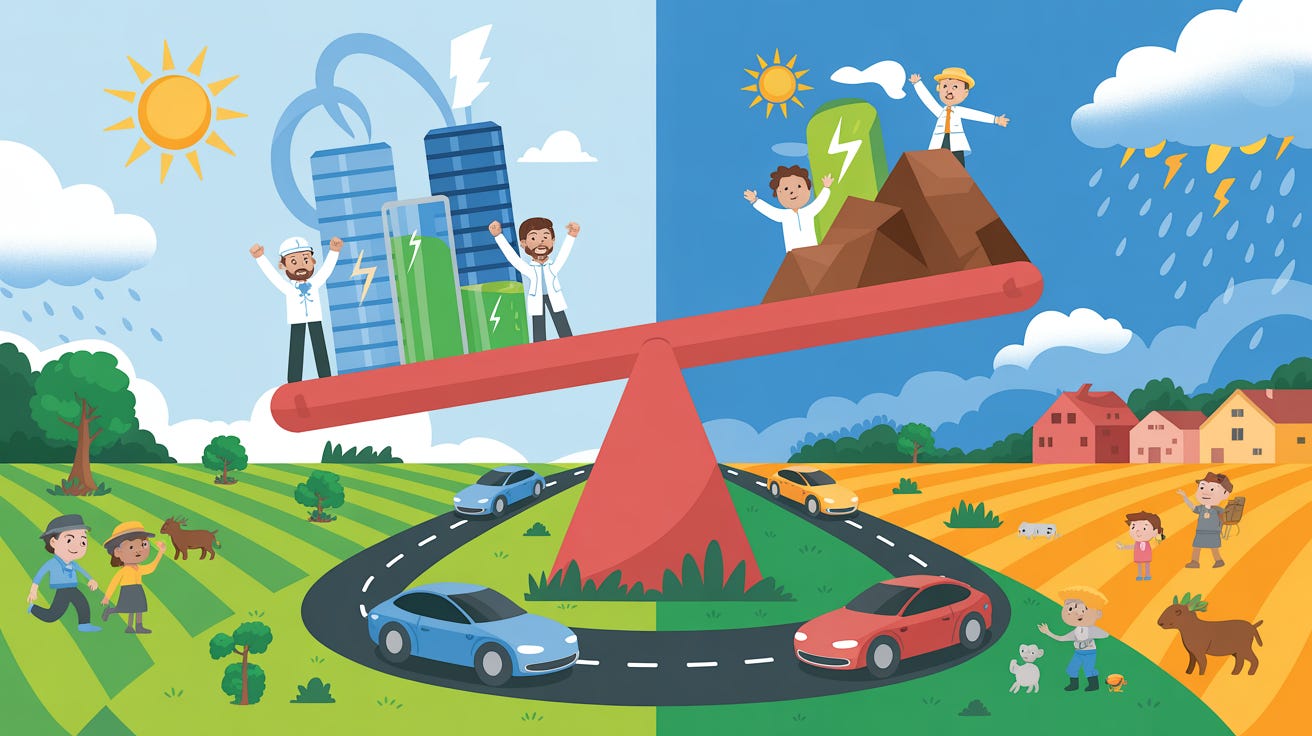Critical Minerals Stole The Show While You Watched Trump-Putin Shake Hands
This week: US is making critical minerals great again; Scientists vs. EPA; Hungary is not doing so well in leading on EVs; Hail is costing you more money in insurance; and one Iraqi gives us all hope
Happy Saturday!
I know, I know. You were probably very busy with Presidents Trump and Putin shaking hands in Anchorage. So I’m here to tell you about all the important things that happened while they made you look!
In this edition:
While you were busy with Presidents Putin and Trump…
Bigger Things:
China became the leader in renewable technology patents
US announced it is making Critical Minerals great again
US Scientists fight back against contested DOE Report. This time for real.
Smaller Things:
Hungary’s attempt to become a European EV leader is not going great
Europe wants more ACs. It’s not great, but it may not have a choice
Hail is making your insurance more expensive
Australia figures out climate change is for real
Cooler Things:
One Iraqi farmer is trying to fight against desertification
The Bigger Things
China Is Leading on Renewable Patents ⚙️:
What Happened? Beijing has amassed nearly 700,000 clean-energy patents, more than half the world’s total, and its filings now dwarf those of every other country. The surge spans solar, batteries and green-hydrogen processes, cementing China’s lead just as global demand for decarbonization technologies accelerates.
Why Care?🤷♂️ Because we might just have to kiss Xi’s ring one day, with China dominating the renewable value-chain. Patents and IP have long been American strengths. Now, China is racing to surpass the US. These patents form the foundation for innovation and future geopolitical power. As the world rushes to decarbonize, this shift will likely tip the balance of power, even if we can’t see it just yet.
US Announces $1B to Bolster Critical Mineral Supply Chains⛏️:
What Happened? The Department of Energy unveiled nearly $1B in grants for five programs that will: Make battery-grade materials; pull key minerals from industrial waste; refine rare earths; speed new extraction tech; and harvest metals from wastewater. This announcement represents the US’s most significant attempt to battle China’s dominance over critical minerals.
Why Care?🤷♂️ Because actually, the US does not want to kiss Xi’s ring. While the proposed amount is a drop in the bucket, it’s about f*ing time that the US works in a coordinated fashion to bolster its rare earth and critical mineral capabilities. With China controlling minerals essential for both defense, renewables, the US finds itself in a geopolitical bind, and is trying to get out of the chokehold. And, while the US currently does not care about renewables, it may switch position once more. Then, it will find out it needs the same critical minerals to rebuild its power base. So, all in all, this move is too little - but not too late.
US Scientists Mobilize Against EPA Efforts🧑🔬:
What Happened? The U.S. Energy Department’s contested climate report has galvanized an unusually swift counter-offensive from researchers: leading climate scientists have set up ad-hoc working groups to draft formal rebuttals, lined up journal op-eds to spotlight alleged data distortions, and are sharing annotated “fact-check” versions of the report across academic networks.
Why Care? 🤷♂️ Because Scientists had enough, and they are moving from observation to action. It seems that little by little, the scientific community is switching modus operandi that runs counter to the usual temper of scientists. A Little Less Conversation, A Little More Action, as they say. And this can serve as a harbinger for what is to come, as the US Administration is locking horns with the scientific community.
The Smaller Things
Hungary is Trying to Be an EV Powerhouse. It’s Not Going Well 🪫:
What Happened? Hungary wanted to brand itself as “Europe’s battery hub”. It’s not going that great. European EV demand is waning, and local pushback on groundwater use and pollution is stalling progress. For example, Samsung SDI and SK On have booked heavy losses and frozen new hiring, CATL has slowed its flagship Debrecen build-out.
Why Care?🤷♂️ Because, once again, the decarbonization of Europe is messy and is anything from a sure bet. Even green initiatives are rife with environmental dangers that local residents just do not like, and this is happening in other countries as well. It does, however, show that countries are more than willing to try national strategies to capitalize on the need to decarbonize, even if leaders like Viktor Orban are not fans.
Europe Wants More ACs. That Might Not Be as Good as It Sounds 🆒:
What Happened? Relentless summer heat waves pound Europe with increased frequency. They have jolted Europeans into buying air-conditioners at record pace, as manufacturers report double-digit sales jumps across the continent. Cooling demand might triple Europe’s electricity use for ACs.
Why Care? 🤷♂️ Because next time you visit the continent, you might have to find the nearest AC. Europe, like the rest of the world, is in for a vicious cycle. ACs, left unchecked, will increase electricity demand and emissions, worsening climate change and requiring more ACs, ad infinitum. Moreover, this will likely create social and political tensions and create all sorts of unintended consequences, like the Urban Heat Island effect. Luckily, the EU is trying to do something about it, with the CoolLIFE project.
Hail is Making You Pay More for Your Insurance 💸:
What Happened? Bigger, more destructive hail, linked to climate change, has push Illinois insurers to raise insurance premiums to consumers. Officials and consumer advocates are demanding proof and stricter oversight, while researchers are offering new efforts to address it.
Why Care? 🤷♂️ Because, as always with the Reconfiguration, the cost land at your doorstep. Climate change is fundamentally reshaping the insurance industry: premiums are soaring, coverage is shrinking, and in some places, insurance is vanishing altogether. We often associate the primary risk with floods, but severe weather comes in many forms, and costs many dollars, hail included. As a result, “insurance deserts” are only expected to grow, which may lead to social unrest and additional nation-wide risks.
Australia Finds Out Climate Change is “Intense and Scary” 😱
What Happened? An unreleased national assessment warns of escalating heat, floods and drought. These threats could slam Australia’s agriculture, tourism, infrastructure and biodiversity, posing “intense and scary” threats to both the economy and environment. The government’s decision to keep the findings under wraps ahead of key economic reform talks has critics blaming the government for leaving them in the dark.
Why Care? 🤷♂️ Because it shows that climate change doesn’t care if you believe it or not. But seriously, Australia’s report is a clear articulation of how climate change is putting Australian economy at risk. The good news is that this report can help steer institutional investors towards the right direction.
The Cooler Things / Something Odd
One Volunteer Fights Iraq’s Mortal Enemy: Desertification
Some people just give you unyielding hope.
Abdul Karim Abbas is one of them.
Abbas, an Iraqi farmer, is fighting Iraq’s true mortal enemy. No, it’s not Israel, Iran, or the US. Rather, it is desertification, which already affects 39% of the country’s land.
Watch more here:
AI-ify the News
As always, here’s an AI-generated picture that should somehow summarize the news. Whether it’s successful or not is up to you to decide.
That’s it for this edition of News Reconfigured.
Stay tuned for my new hot take on Tuesday, and see you soon next week!
…oh, and don’t forget to subscribe - it would mean a lot! 🔽










